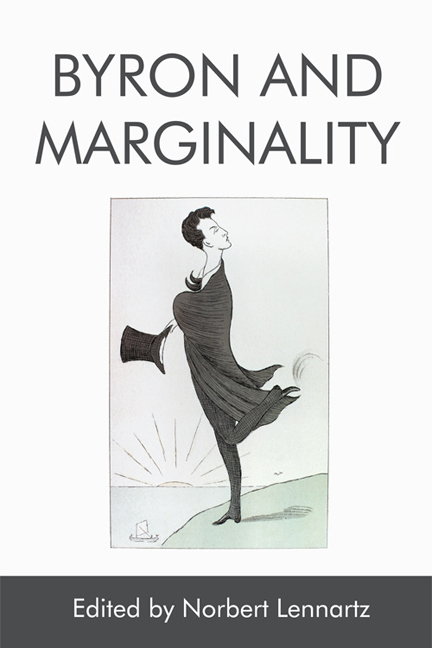Book contents
- Frontmatter
- Contents
- Foreword
- Acknowledgements
- Editions and Abbreviations
- 1 Lord Byron, Wandering and Wavering between the Centres and Margins of Romanticism: An Attempt at an Introduction
- I Byron’s Marginalisation in Romantic World Literature
- II Byron’s Marginal Identities and Places
- III Cherishing the Marginal – Marginal Genres in Byron
- IV On the Provocative Margins of Taste
- V Marginal Affairs – Visual and Paratextual Aspects in Byron
- List of Contributors
- Index
10 - The Margins of Genius: Byron, Nationalism and the Periodical Reviews
Published online by Cambridge University Press: 06 May 2021
- Frontmatter
- Contents
- Foreword
- Acknowledgements
- Editions and Abbreviations
- 1 Lord Byron, Wandering and Wavering between the Centres and Margins of Romanticism: An Attempt at an Introduction
- I Byron’s Marginalisation in Romantic World Literature
- II Byron’s Marginal Identities and Places
- III Cherishing the Marginal – Marginal Genres in Byron
- IV On the Provocative Margins of Taste
- V Marginal Affairs – Visual and Paratextual Aspects in Byron
- List of Contributors
- Index
Summary
The dichotomy of respectable art and popular entertainment is a significant element in the hierarchy of professional authorship. This dichotomy can be traced back to the late eighteenth and the early nineteenth centuries, when writers for the first time encountered a potential mass audience due to the increase in both literacy and printed material, leading to an economic incentive for authors to reach as many readers as possible. These developments coincided with the heightening of public interest in artistic genius along with the belief that true genius was misunderstood by the public. This, in turn, created a juxtaposition between the authors’ ambitions of reaching as vast a readership as possible and the idea that writers with true genius cared little for the contemporary response. A debate arose around the question of whether or not a work could be considered the product of genius if it was also popular among the mass audience. A related question was whether or not it was acceptable for a genius author to seek contemporary popularity in addition to, or even instead of, posthumous fame.
In what follows I present a case study on the treatment of Lord Byron as a man of genius in the early nineteenth-century media. Byron was branded a genius from early on in his career as a poet, but he was also seen as someone who openly pursued contemporary popularity. He occupied a space at the margins of genius and the crossing point between high and popular culture, and this brought criticism from several contributors to the periodical press. What was seen as particularly problematic was Byron's perceived wasting of his genius on works designed to garner favour among the mass readership. Another theme that often comes up in the early nineteenth-century writing on genius is the relationship between genius and the nation that has produced it, and I suggest that there is a link between the discourse on national genius and the critics’ dismay at Byron's profligate employment of his talent. I propose that one reason for the often hostile treatment of Byron in the Romantic media is that genius was perceived to be something that did not belong solely to the artist but rather to the nation that had produced him or her.
- Type
- Chapter
- Information
- Byron and Marginality , pp. 186 - 204Publisher: Edinburgh University PressPrint publication year: 2018



